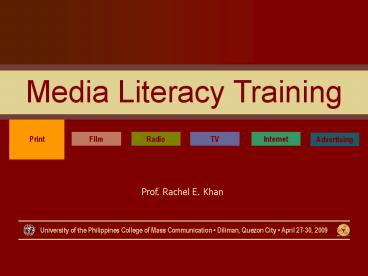Media Literacy Training - PowerPoint PPT Presentation
1 / 20
Title:
Media Literacy Training
Description:
Rather, they present carefully crafted constructions that reflect many decisions ... celebrity gossip. Audiences negotiate meaning in the media ... – PowerPoint PPT presentation
Number of Views:94
Avg rating:3.0/5.0
Title: Media Literacy Training
1
Media Literacy Training
Radio
TV
Film
Internet
Advertising
Prof. Rachel E. Khan
University of the Philippines College of Mass
Communication Diliman, Quezon City April
27-30, 2009
2
All media are constructionThe media do not
present simple reflections of external reality.
Rather, they present carefully crafted
constructions that reflect many decisions and
result from many determining factors.
3
Characteristics of News
1. Timeliness or Immediacy Keep in mind that news
is a perishable product. Even in a newsletter
which does not come out daily, its contents
should not be stale. 2. Importance Stress is
on important information, i.e. stories that
affect, involve or interest majority of readers.
4
Characteristics of News
3. Prominence Stories about well known
individuals, such as politicians, entertainers,
business leaders, officials of the
organizationare more newsworthy than stories
about less known people. 4.
Proximity Journalists consider local stories more
newsworthy than stories that occur in distant
places. Why? Because it is more likely to affect
their readers. . 5. Oddity Charles Dana
--1882 If a dog bites a man it is not news
but, if a man bites a dog, then that is news.
5
The media construct realityThe media are
responsible for the majority of the observations
and experiences from which we build up our
personal understandings of the world and how it
works.
6
Newspapers
The front page of a newspaper contains the main
stories as deemed by the editors. The major
story of the day will be placed in the most
prominent position and contain a large,
bold-faced headline. The topic could be of a
national scope or it could be a local story.
7
Magazines
Magazines Some issues -manufactured
reality -objectification of women -defining
health, beauty, sex, age -celebrity gossip
8
Audiences negotiate meaning in the mediaThe
media provide us with much of the material upon
which we build our picture of reality, and we all
"negotiate" meaning according to individual
factors personal needs and anxieties, the
pleasures or troubles of the day, racial and
sexual attitudes, family and cultural background,
and so forth.
9
Agenda Setting Theory - The media use objects or
issues to influence the public on two levels a.
The media suggest WHAT the public should think
about (amount of coverage). b. The media focuses
on the characteristics of the objects or issues.
In this level the media suggest HOW the people
should think about the issue.
10
(No Transcript)
11
Media have commercial implicationsMedia Literacy
aims to encourage an awareness of how the media
are influenced by commercial considerations, and
how these affect content, technique and
distribution.
12
Media Ownership
- Medias business orientation
- - profit-driven
- highly-competitive
- Monopoly of enterprise monopoly of ideas
- - reduced diversity of issues and perspectives
- - growing uniformity of content
- - undemocratic control of public information
- - controlled information inhibited by uniform
self-interest
13
Media Ownership
Effects of concentrated ownership - social and
cultural loss - self-serving censorship of
political and social ideas - creation of a
distorted reality and impoverished ideas -
undemocratic control of public information - lack
of public accountability - the risk of increased
economic and political influence, i.e. when big
media is owned by big business, there is less
criticism of big business or related political
issues in big government
14
Business interests
COMMERCIAL leanings of news Philippine media
owes a lot to advertisers. This however presents
problems in the newsroom when business relations
and newsworthiness are in conflict. This is
because for some programs, these advertisers are
all they have for the shows survival.
15
Media Ownership
When a stockholder or advertiser is the subject
of a negative news story, the story is waived and
the writer told to back off. Sometimes incidents
like this come naturally. In some cases, not just
one but two advertising accounts could go down
with an attack on a big businessman. (e.g. Lucio
Tan tax evasion and his Fortune)
16
Media contain ideological and value messagesAll
media products are advertising, in some sense, in
that they proclaim values and ways of life.
Explicitly or implicitly, the mainstream media
convey ideological messages about such issues as
the nature of the good life, the virtue of
consumerism, the role of women, etc.
17
Media have social and political implicationsThe
media have great influence on politics and on
forming social change. The media involve us in
concerns such as human rights issues, disaster
victims, and poverty issues. They give us an
intimate sense of national issues and global
concerns, so that we become citizens of Marshall
McLuhan's "Global Village."
18
Form content are closely related in the
mediaAs Marshall McLuhan noted, each medium has
its own grammar and codifies reality in its own
particular way. Different media will report the
same event, but create different impressions and
messages.
19
Marshall McLuhan meant when he famously said "the
medium is the message." Television is the "cool
medium" because it provides less information than
newspapers but appeals to our senses through the
swift progression of images. Newspapers and radio
make up the "hot medium" because they demand less
attention from the senses and more from the
reasoning part of the brain.
20
Thank You.































